AT JUST 26, Thomas Müller is already an unquestioned star of German football.
When Man United were linked with an audacious £70million move for the Bayern Munich man in the most recent transfer window, it showed how highly the player has come to be regarded.
In addition to 79 goals in 205 appearances for Bayern, he also has 30 goals in 65 caps at international level — just less than a goal every second game, which is a highly impressive stat for someone who is not even regarded as an out-and-out striker.
As well as starring in two World Cups, winning the Golden and Silver Boot in 2010 and 2014 respectively, Müller also impressed in Germany’s most recent Euro 2016 qualifier with Scotland at Hampden Park, as the visitors emerged with a 3-2 victory.
In a recent interview with The42, leading German football writer Rafael Honigstein encapsulated what makes Müller such a special player, explaining:
“Thomas Müller is almost incomparable, because he is not the most graceful of players. He doesn’t strike you as someone who has fantastic technique. But he has this uncanny knack of finding space and finding situations where goals will arrive.
“A lot of people have compared him to Gerd Müller, who of course was a very different player, but also had this habit of popping up at the right time and scoring.
“He once told me that because he’s not so good below the waistline, he has to be really smart above the neck. I think that sums it up — he plays with his head half the time, not with his feet. And I think he also keeps fooling opposition players who think this guy is nothing special. But then suddenly, he’ll score three goals against you.”
These qualities were amply demonstrated in the Scotland game, as — not for the first time — Müller turned out to be Germany’s match-winner.
Intelligence
One player that Müller is not totally dissmilar to is ex-Man United and Tottenham striker Teddy Sheringham.
Like Sheringham, he is not especially fast and you don’t often see him sprint. However, also like the former England international, he reads the game exceptionally well and plays with a conspicuous degree of intelligence.
The image above shows Müller instructing his teammate in the early stages of the game. Scotland are backing off from Germany and allowing them time on the ball, as they did for large periods of the match. Ireland, of course, played a similar style away in Germany, though at home, the Boys in Green may want to adopt a less negative mindset and actually apply some pressure on the German defence.
Playing between the lines
The image above shows the kind of position Müller took up time and again during this encounter, finding space between the Scottish defence and midfield with his clever movement.
Consequently, the play predominantly went through Müller, with Scotland simply not marking the attacker tightly enough.
Müller is arguably Germany’s most influential player and surely their biggest attacking threat. Given the influence he enjoyed and impact he made in this most recent match, Martin O’Neill may want to strongly consider man-marking the player. It would not be appropriate to delegate a defender with this task, given how Müller tends to drift all over the pitch and seldom sticks to his position for a full 90 minutes. Sacrificing a midfielder accordingly may be necessary, and with Glenn Whelan suspended, giving the responsibility to James McCarthy or whoever replaces his usual partner in midfield may be the best option.
Otherwise, Müller could inflict similar harm on Ireland as he did to Scotland at Hampden.
It was incredible that the Scots didn’t do more to curtail the Müller threat however, given how much joy he was having in the early stages. Although one recurring theme of Müller’s career is his opponents’ tendency to underestimate him. He is not blessed with the obvious talent of a Lionel Messi or a Cristiano Ronaldo — indeed, he often looks a little languid and awkward for a supposedly top-class footballer. Yet the stats illustrate that, in spite of these perceptions, he can be as potent as any attacker in Europe on his day.
Difference maker
On 18 minutes, with Scotland having failed to heed the earlier warnings, Müller finally punished them.
It emanated from a superb bit of skill by the German international, even if this passage of play was error-ridden from a Scottish perspective.
There are two big problems with the Scottish defending here. Firstly, James McArthur commits himself and fails to win the ball, allowing Müller plenty of space to run into in the process.
Secondly, the Scottish defence are noticeably hesitant and clearly back off, naively inviting such a potent player to take on a shot at goal.
In the end, Müller got the good fortune that his positive play deserved, as the ball found the back of the net via a wicked deflection off centre-back Russell Martin. There was an element of luck to it of course, but Müller still had the confidence to shoot as well as the strength to shrug off the attempted last-ditch challenge by Scott Brown.
If the above goal feels a tad familiar, it’s because you’ve seen a variation of it before. Remember this?
Notice the time Toni Kroos has on the ball and the lack of pressure on him. Stephen Quinn made it too easy for his opponent to get a shot away and Ireland almost dropped all three points as a result. And perhaps it’s no coincidence that Quinn hasn’t started a competitive fixture for Ireland since then.
Therefore, Ireland cannot afford to make the same mistake again. They must ensure that Müller, Kroos or any Germany player is intensively pressurised when they’re in and around the penalty area, with the visitors’ sharp attack highly proficient at exposing any lapses in concentration.
As Honigstein added in the aforementioned interview: “They tend to win games against teams who don’t want to play football against them. They’ve developed ways to find openings and they’ve become really good at playing against sides like Scotland, who had six men in a line defending at Hampden.”
Another bailout
One flaw of Germany’s that Scotland exposed in this game was the visitors’ unreliable defending from set pieces.
The Germans had dominated and controlled the game, yet 10 minutes after Müller’s opener, Scotland managed to get themselves back in the match.
Like the first goal, there was an element of fortune about it, nonetheless it still was preventable, as Shaun Maloney’s free-kick deflected in off Mats Hummels, after Manuel Neuer had made the initial save. Hummels could have been far sharper, but instead looked leaden-footed and hapless, as he clumsily bundled the ball into his own net, rejuvenating a downbeat home crowd in the process. Neuer, meanwhile, will also be disappointed with his efforts in this instance.
The incident epitomised a degree of nervousness that was evident in the German backline throughout the 90 minutes. It was a highly conservative performance from Scotland in which they seldom ventured forward in numbers, and yet they still managed to score not one but two unlikely goals.
Consequently, the German defence, particularly with regard to set pieces, is an area O’Neill and co may look to target on Thursday night.
Discipline
While Müller is renowned primarily as an attacking, creative player, unlike many world-class forwards, his defensive, tactical discipline is exemplary to boot.
On the rare occasions that he needed to in this game, the Bayern Munich man put in an honest defensive shift, thus helping to ensure his side could promptly regain their dominance of possession.
It is not dissimilar to the type of discipline Müller needs to continually make incisive runs off the ball over the course of the game, even if 7/10 times, he may not receive possession.
Continuing threat
Throughout this game, you got the sense that Germany could step their performance up another level if required — such was their casual attitude that they played the game virtually at walking pace at times.
It felt almost too easy on occasion for Germany — in the first half alone, they completed 430 passes in comparison to the Scots’ 90. This gaping technical superiority may partially explain the away team’s tendency to look a little lax sporadically.
The Scots, however, had failed to learn the lessons from the first goal, and again, were giving Müller far too much space and freedom to roam, rarely treating the Bayern star with the respect he clearly warranted.
Therefore, it was hardly a surprise and perhaps somewhat inevitable that Müller scored again, just six minutes after Scotland had equalised.
On this occasion, it was more of a team goal, with Müller demonstrating his characteristic goalscorer’s knack for being in the right place at the right time.
Notice as well how quickly he manages to turn and react to the ball, which is flying across the box at considerable speed. It’s certainly not as fortuitous a goal as it may initially seem, with Müller demonstrating impressive sharpness to restore his side’s lead (and yes, it was definitely over the line).
It was odd how Scotland continually failed to properly pick up their opponents’ star player, though his movement and footballing intelligence no doubt contributed immensely in his successful attempts to consistently evade would-be markers.
Müller’s tendency to roam also would have made certain Scottish players reluctant to pick him up. Having started very much in a false nine central role, he increasingly stuck to the right wing, allowing teammates Mario Götze and Mesut Özil to occupy the central berth at varying points in what was an impressively fluid formation.
Nonetheless, the Germans seemingly took their foot off the pedal once more, allowing Scotland to find another equaliser on the brink of half-time — again, via a set piece.
A corner was poorly half-cleared and an unmarked James McArthur made up for his mistake on the first German goal by finishing expertly.
Unsurprisingly however, the lead again did not last too long, as Germany upped the ante once more, with Scotland having no response.
While he didn’t score this time, Müller again was at the heart of the attack. In a well-worked team move, the Bayern Munich star showed exceptional movement and awareness to set up İlkay Gündoğan for a simple finish.
Notice the perfect timing of the run and the pinpoint delivery — in an instant, it epitomises all that’s good about Müller.
A (relatively) quiet half hour
The third German goal seemed to demoralise Scotland ultimately.
Again, Germany appeared to lessen their intensity somewhat, even if Müller was still intent on playing in the right manner and posing a threat in the final third.
The Bayern star’s influence grew more peripheral as his team’s play became less ambitious. Perhaps Germany sensed they wouldn’t need a fourth goal, as the Scots’ reaction thereafter was tepid. The hosts barely carved out a decent chance for the duration of the second half, and their rivals continued to dominate the ball for the most part, stemming any potential momentum the Scots might hope to garner with their calm, patient and controlled approach.
But while their attack play was no longer as impressive, Müller continued to serve as a vital cog in the machine.
Conclusion
Though the 3-2 outcome made it look like a tight and tantalising affair, in reality, the difference between Germany and Scotland was vast on the night.
The odd shaky moment at the back aside, the Germans looked comfortable for the majority of the contest.
Ireland simply cannot afford to make it look so easy for the Germans and in particular, Thomas Müller, to dictate the flow and tempo of the game
The Boys in Green cannot afford to be so lacking in intensity as the Scots were or risk being slowly worn down by Müller and co.
Martin O’Neill may also want to consider man-marking Müller, such is his influence in making this German side tick, while the Ireland coach will also surely be aware of and have prepared for his upcoming opponents’ obvious vulnerability from set pieces.







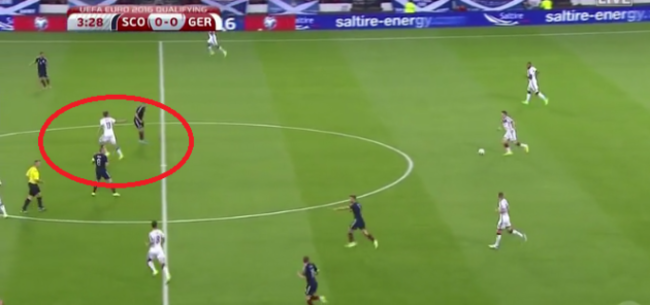
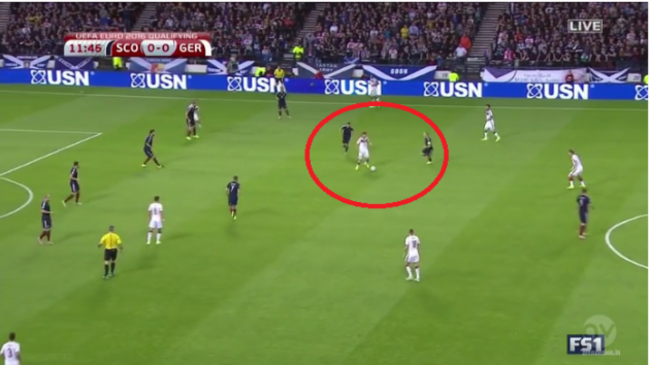
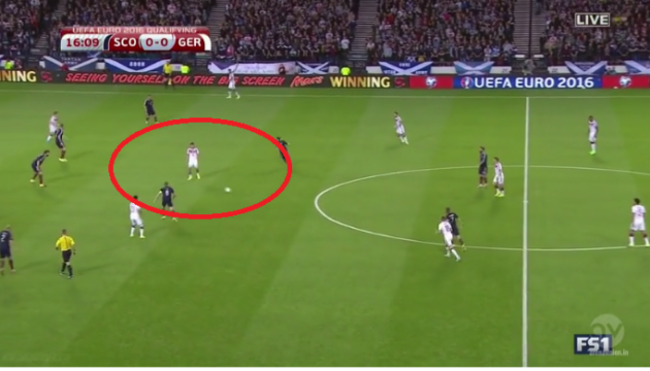
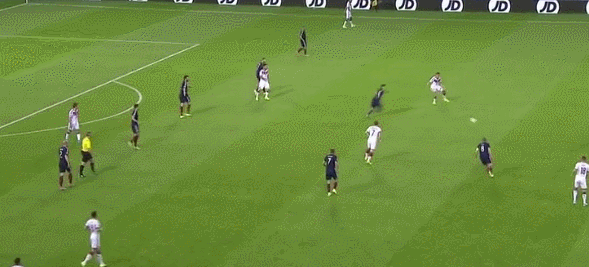
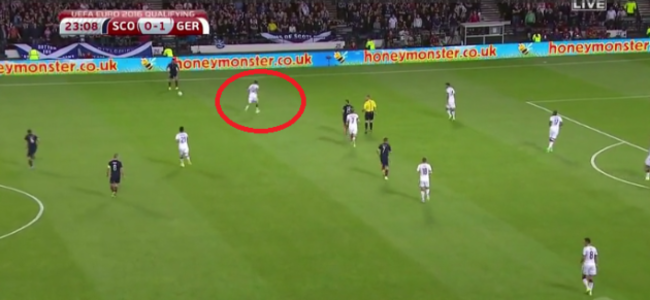
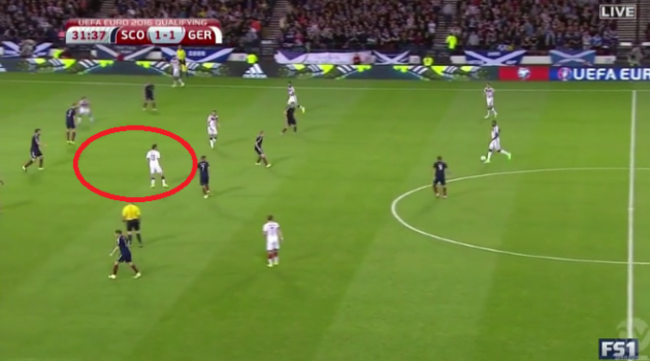
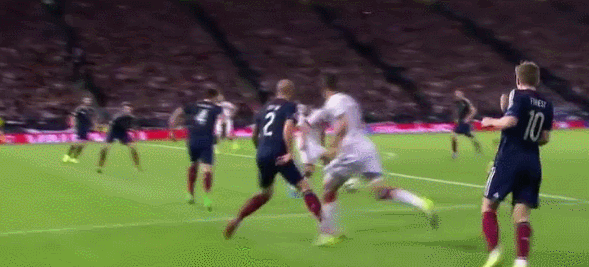


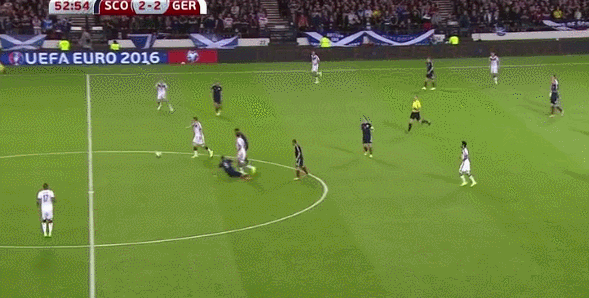
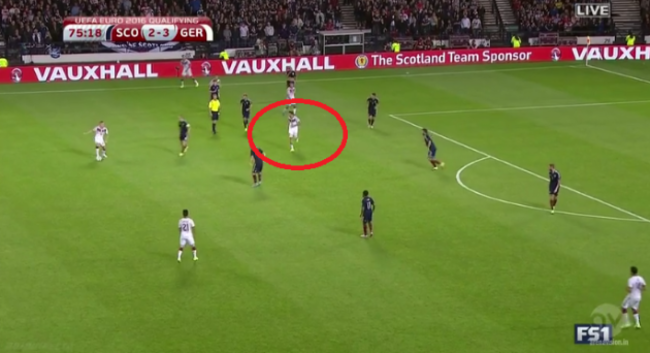
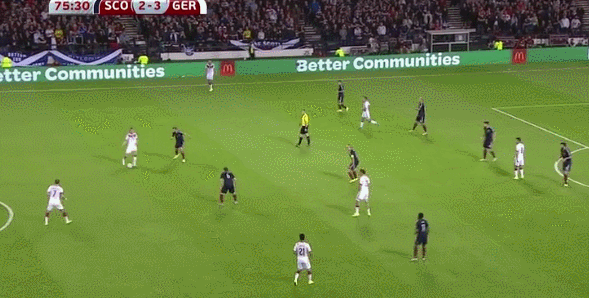




Ask me in 24 hrs !! COYBIG
He’s a wriggly fella, hard to man mark, also dangerous if you mark the space he can do the unthinkable and hurt you with a bit of magic, great player!!
Dress Philly mcmahon up as o Shea and throw him on
mam mark him with a crunching tackle early! make sure u win the ball Nd burst him 2
Is your mam in the squad?
Unfortunately you could ask the same
Question about kroos, gudogen, schurrle, ozil and gotze (if they play), which ultimately means that you can’t man-mark any of them……
Who cares, we haven’t a hope in this boring sport. Giving it so much attention like we’re in with a shot is pointless.
lol
lol
hope Ireland get a result but it will be tough if mourinho was manager I would be confident of a result
Have u been confident in Chelsea this season? How has that worked out Matt? What is it 2 wins out of 8? Great record.
If he goes with the Diamond it should be the following(I’d have Pearce for McShane but he doesn’t even make the Derby bench,McShane starts and Captains for Reading and has improved over the past 2 seasons)
Given
Christie-O’Shea-McShane-Brady
Meyler
McCarthy-Hendrick
Hoolahan
Walters-Long
Otherwise
Given
Christie-O’Shea-McShane-Brady
McCarthy-Hendrick
Walters-Hoolahan-Judge
Long
Why not throw Jusge in,full of creativity and this is do or die at this stage.